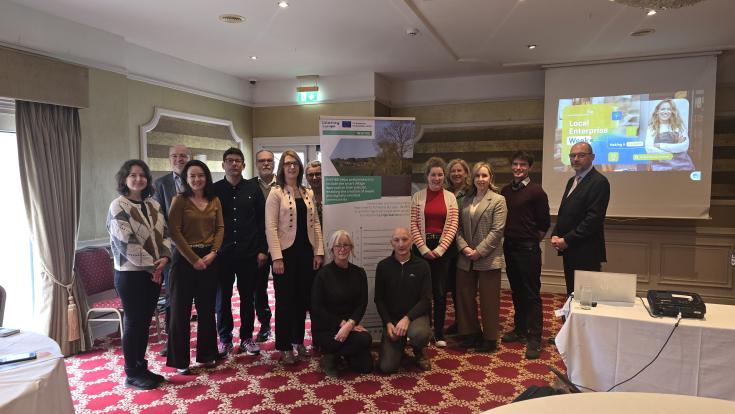2nd Regional Stakeholder Meeting - Ballyhoura Region (IE)
As part of the Interreg Europe INSPIRE project, three impactful Regional Stakeholder Meetings (RSMs) were held in March 2025, bringing together stakeholders from diverse sectors to explore the potential of digital transformation for rural communities in Ireland. These events were pivotal in fostering collaboration and knowledge exchange, with a particular focus on how digital solutions can enhance rural enterprises and communities.
The first of the meetings took place on March 6, 2025, at the Firgrove Hotel in Mitchelstown, Co. Cork. This session was dedicated to driving digital success for small and medium-sized enterprises (SMEs) in rural areas. Ballyhoura Development CLG, in collaboration with the Local Enterprise Office (LEO) Cork North & West, hoste the event focused on the benefits of digital tools for rural businesses. Participants discussed the advantages of adopting digital solutions, such as increased productivity, efficiency, and enhanced client engagement. However, they also acknowledged the challenges that come with digital adoption, including high costs, time constraints, and limited resources. SMEs expressed a strong need for tailored support, particularly through one-on-one mentoring, demo sessions, and easier access to funding and training. Local networking opportunities were also seen as essential to encouraging innovation and easing the transition to digital technologies.
Two days later, on March 8, 2025, the second RSM was held at Spruce & Willow in Ardpatrick, Co. Limerick. This event gathered local businesses, tourism stakeholders, and community leaders to explore the potential of digital transformation in the Ballyhoura region’s tourism sector. A key topic of discussion was the role of digital tools in enhancing business operations, from managing websites to utilising artificial intelligence (AI) for customer engagement. A significant concern raised was the lack of infrastructure, specifically unreliable Wi-Fi and broadband, which hindered many stakeholders from fully embracing digital solutions. There was also a clear fear of change among older generations, who were reluctant to move away from traditional business models. To address these challenges, the stakeholders called for comprehensive training programs, ongoing mentoring, and a strategic analysis to identify the digital gaps in the tourism and community sectors. The discussion also highlighted the importance of collaboration with national bodies like Fáilte Ireland to ensure a coordinated approach to digital adoption.
The final RSM took place virtually on March 12, 2025, via Zoom, and involved local government representatives, statutory bodies, and several community-focused organisations. This meeting provided an opportunity for an update on the INSPIRE project and focused on advancing policy improvements related to digital inclusion for rural areas. The stakeholders recognised the critical importance of bridging the digital divide between urban and rural areas, with an emphasis on improving digital literacy, infrastructure, and access to online resources in rural communities. A key focus was on leveraging the SICAP (Social Inclusion and Community Activation Programme) to promote digital transformation. Leveraging the Policy Instrument, SICAP was identified as a key focus to promote digital transformation. Participants agreed that policy shifts are necessary to ensure that digital solutions are accessible to all, particularly at the individual and community levels.
As the discussions concluded, several key agreements and actions emerged from the three Regional Stakeholder Meetings, reinforcing the shared commitment of all participants to advancing digital transformation in rural Europe. Central agreements were the continued collaboration between stakeholders across different sectors to foster digital inclusivity, the need to address digital infrastructural gaps in rural areas, and the urgent need for targeted training and support for businesses and individuals to enhance their digital capabilities.
As the INSPIRE project progresses, stakeholders are optimistic that these agreements and actions will lead to tangible outcomes. The collective efforts of all involved are driving toward a digitally inclusive and resilient rural Europe, where digital solutions empower communities, support sustainable growth, and narrow the urban-rural divide.

